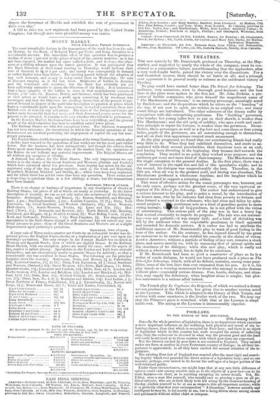THE THEATRES.
THE new comedy by Mr. Bourcicault, produced on Thursday, at the Hay- market, and supported by nearly the whole of the company, must be con- sidered as a comparative failure, notwithstanding that the applauders, after a very well-fought battle, gained the victory over the dissentients. For a real theatrical success, there should be no battle at all; and a triumph over opponents is in general nearly as ruinous as the celebrated victory of Pyrrhus.
No play could have started better than The School for Scheming. The audience, very numerous, were in thorough good.humour; and the best lines in the piece were spoken in the first act. Mr. John Perkins, a pro- jector of bubble companies, who gives himself the magnificent name of " The Macdunnun of Dunnun," is an amusing personage, amusingly acted by Buckstone; and the disquisitions which he utters on the " humbug " ot the day, if not new in spirit, are written in an original vein; and many smart things are introduced. The other schemers of the drama suffer by comparison with this enterprising gentleman. The " finishing " governess, who teaches her young ladies how to put on their shawls, is weaker than The Macdunnun; and the old sprig of nobility, who apes youth and sacri- fices principle to repair his fortune, is weaker than the governess. Never- theless, these personages, as well as a fop lord and some three or four young ladies, pupils of the governess, are all entertaining enough in themselves, and all on their first appearance created much amusement.
As the play progressed, we found that our entertaining friends had really very little to do. When they had exhibited themselves, and made us ac- quainted with their several peculiarities, their functions were at an end; and having been diverting in the beginning, they became dull towards the conclusion. They tended to no point, they worked to no purpose; and the audience got more and more tired of their company. The Macdunnun was the single exception to the general decline. In the.first place, there was a sort of interest in the rapid rise and fall of this speculative wight; and in the second, his dialogue was unquestionably the best. Therefore, in the fifth act, when all was in the greatest peril, and hissing was abundant, The Macdunnun produced a wholesome reaction; and the laughter which he created seemed to support a tottering edifice.
This want of effective action for the comic personages was, however, not the only cause, perhaps not the greatest cause, of the very equivocal re- ception of The School for Scheming. The author had endeavoured to give a serious interest to his play, and to point a moral, by the introduction of an honest man, who by his industry had risen from poverty to fortune, and thus formed a contrast to the schemers, who had risen and fallen by ephe- meral projects. • gentleman acts as a kind of guardian genius to more erring mortals; bith all his] goodness, he is not gifted with the virtue Int
of entertaining, is serious part of the play was in fact a heavy log,
that seemed constantly to impede its progress. The tale was not interest- ing—was not pathetic—it was simply dull; and a kind of shrinking was felt by the audience when the respectable gentleman in black appeared and recorded his domestic sorrows. It is rather too bad to attribute the indifferent success of Mr. Bourcicault's play to want of good feeling in the tone of the author. On the contrary, he has injured himself by too great an endeavour to be moral—has stabbed his comedy at the shrine of virtue. London Assurance, without a particle of feeling of any sort, remains a stock piece, and moves merrily on, with its unceasing flow of animal spirits and the smartness of its dialogue; while this new play, which is really not without a wholesome moral, has to fight for its existence.
If Mr. Bourcicault had been as good a constructer of plays as he is a writer of comic dialogue, he would not have produced such a piece as The School for Scheming; which, with all its defects, contains, among some puer- ilities, some of the best lines that ever emanated from his pen. As it is, his play stands as a warning monument for those who attempt to make dramas without plots—especially serious dramas. Fun, bustle, dialogue, and situa- tion, may supply the deficiency, when laughter alone is sought; but plot- less seriousness is a serious stair indeed.


























 Previous page
Previous page